This is the second part of my comic on free time and work, translated by Una from unadtranslation.com 🙂
A few videos for further information (in French)
A vidéo from Usul about Friot and a wage for life
https://www.youtube.com/watch?v=uhg0SUYOXjw
A video from “Arrêt sur images”
https://www.arretsurimages.net/…/Revenu-de-base-On-sacrifie…
A conference from a former executive who followed the same path I did : Economie mon amour
https://www.youtube.com/watch?v=C9ENnG4e5HY
The famous conference from Lepage about work !
https://www.youtube.com/watch?v=7Ajj3ui8l98

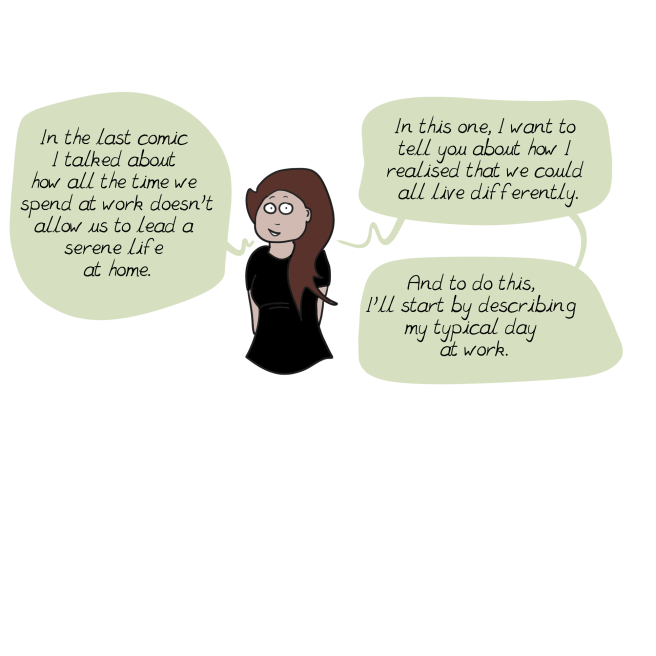
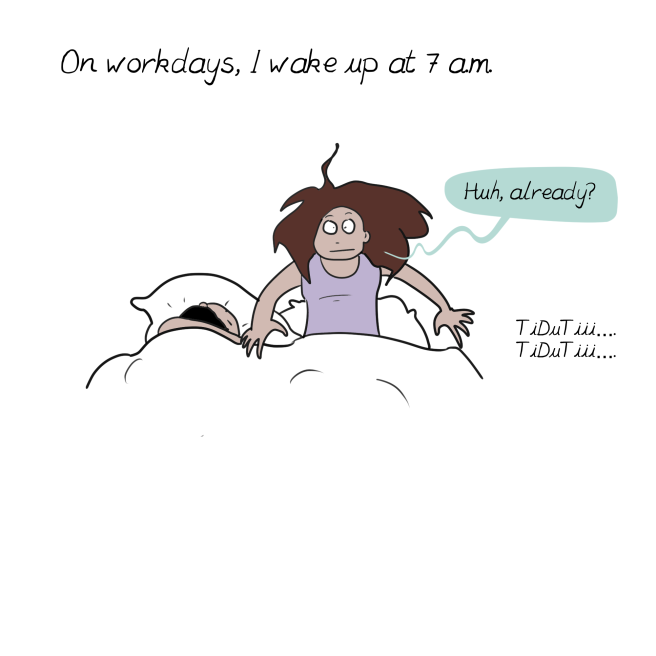
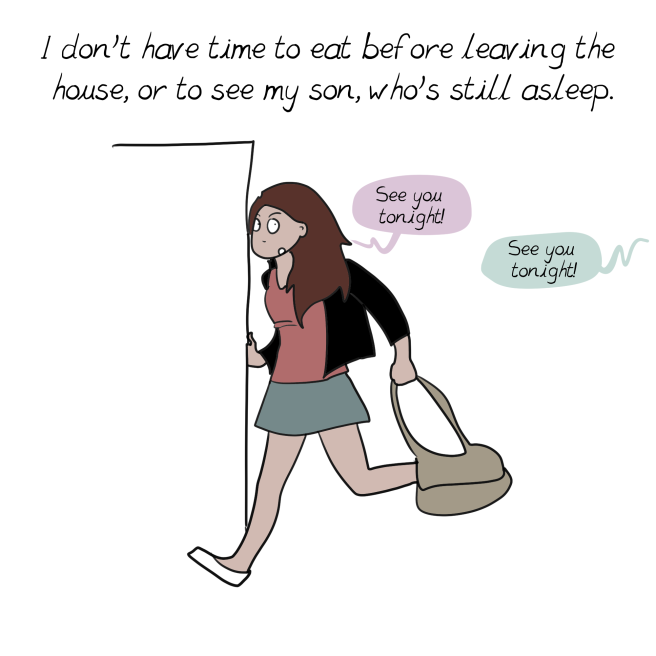
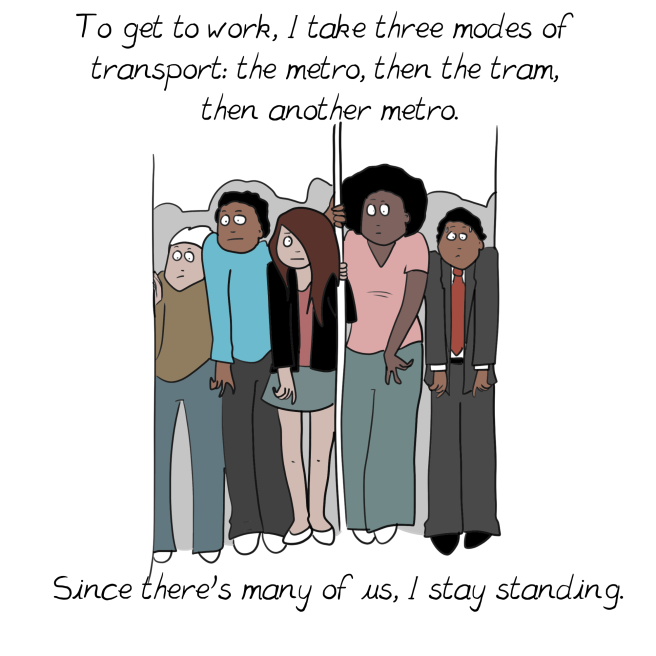


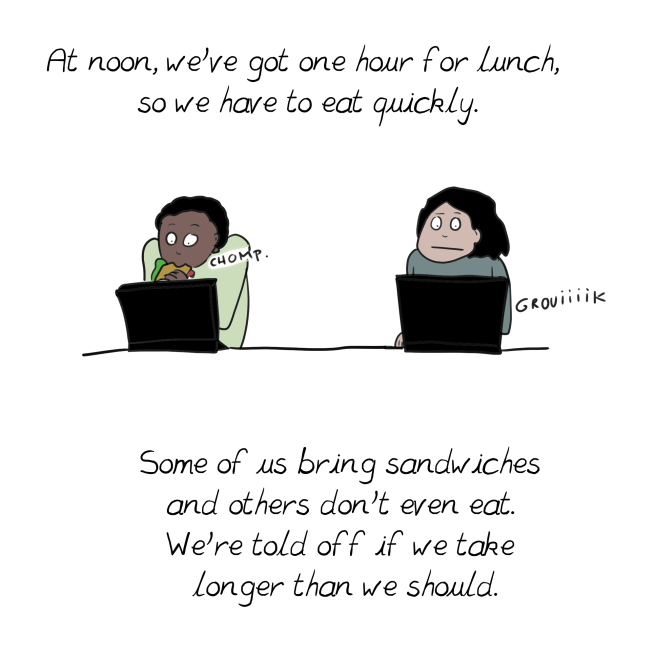
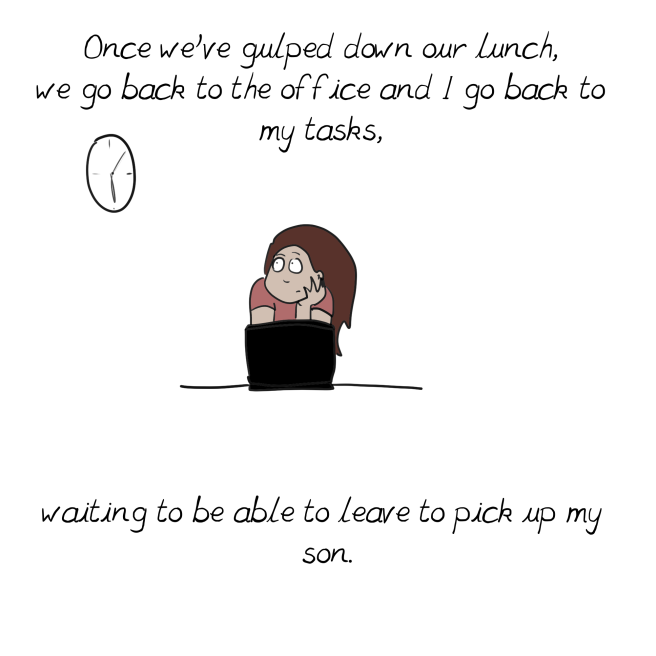
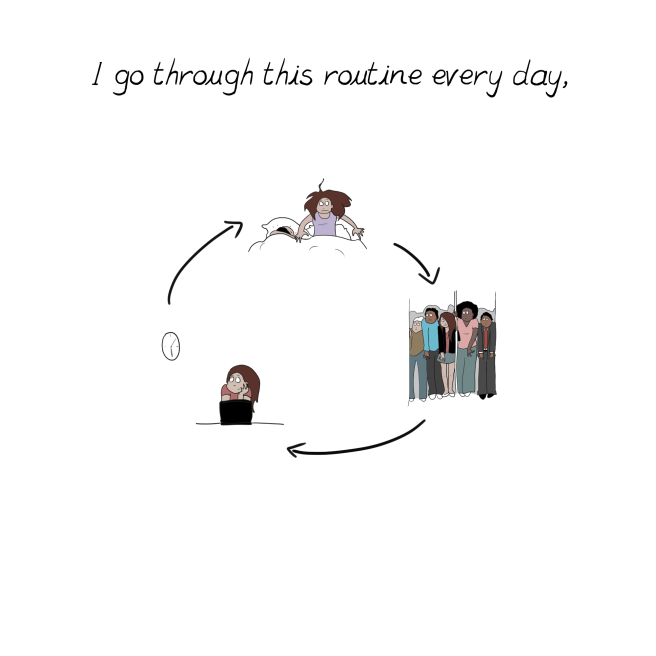


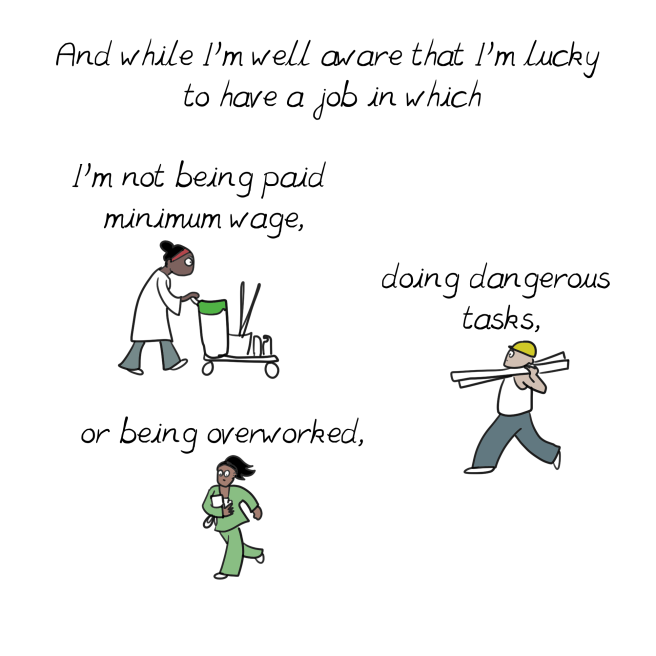
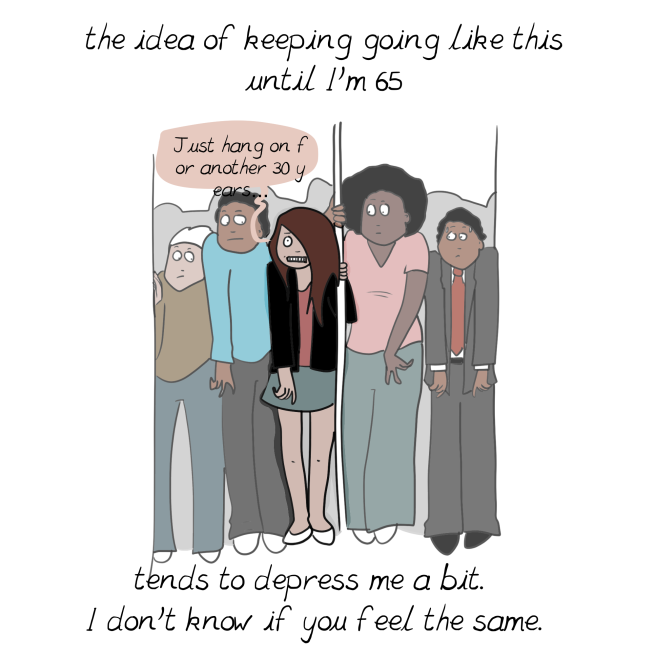

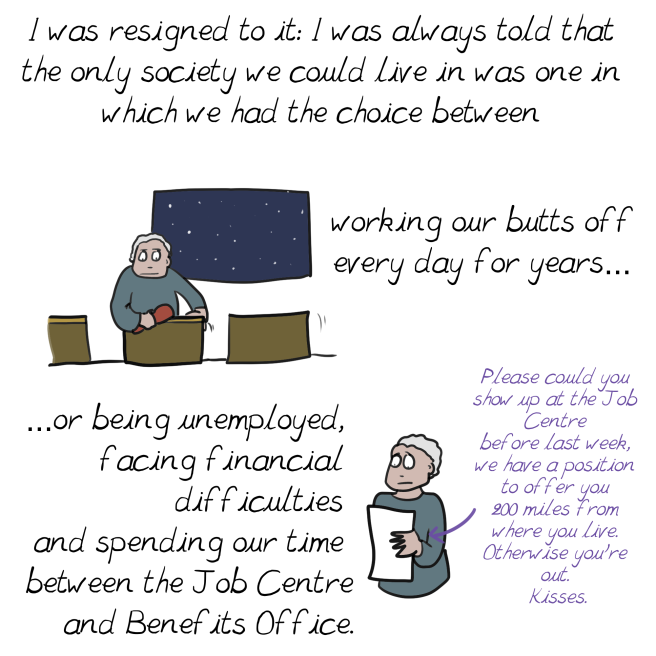
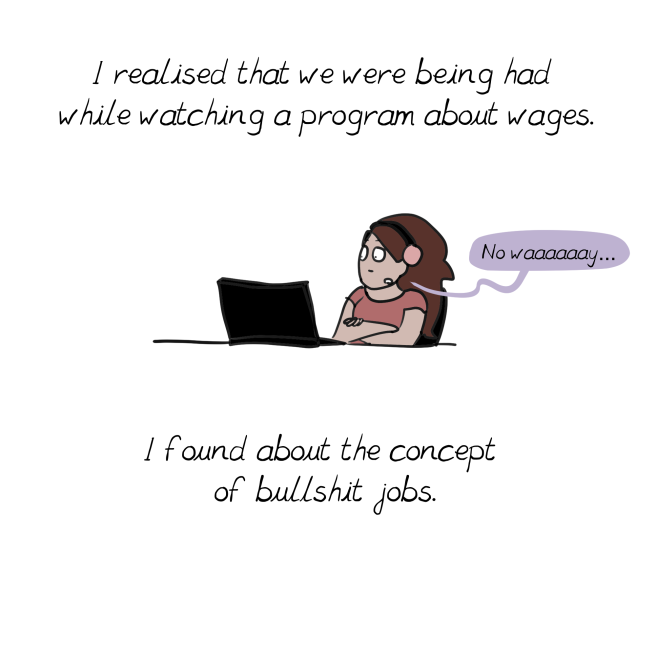
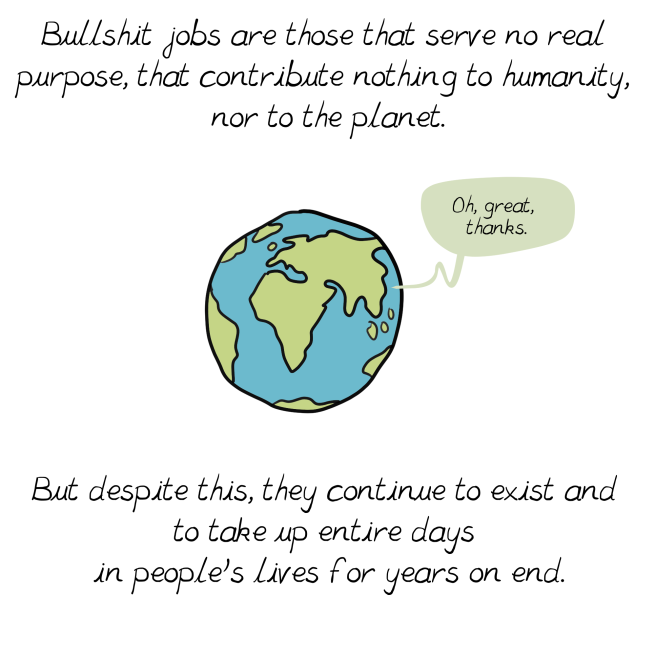
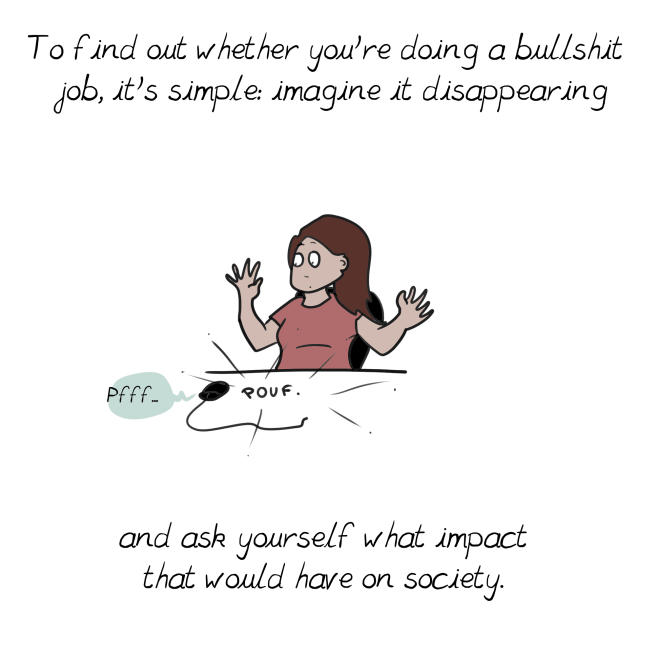
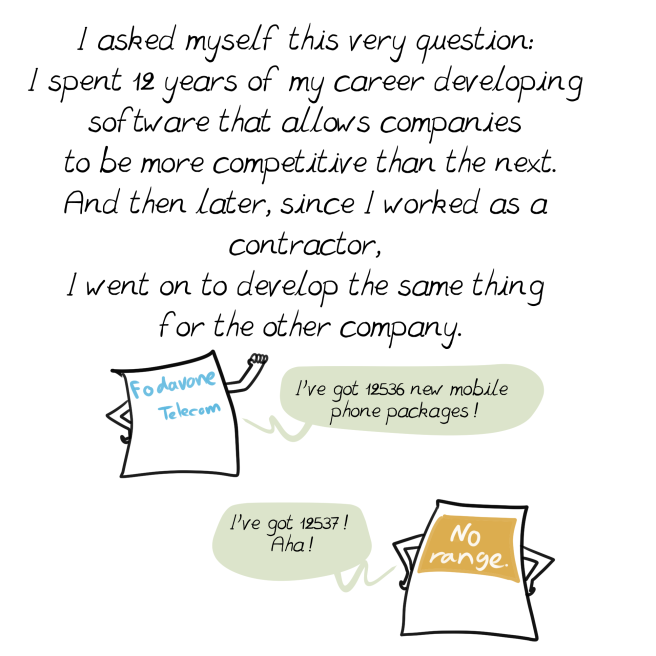
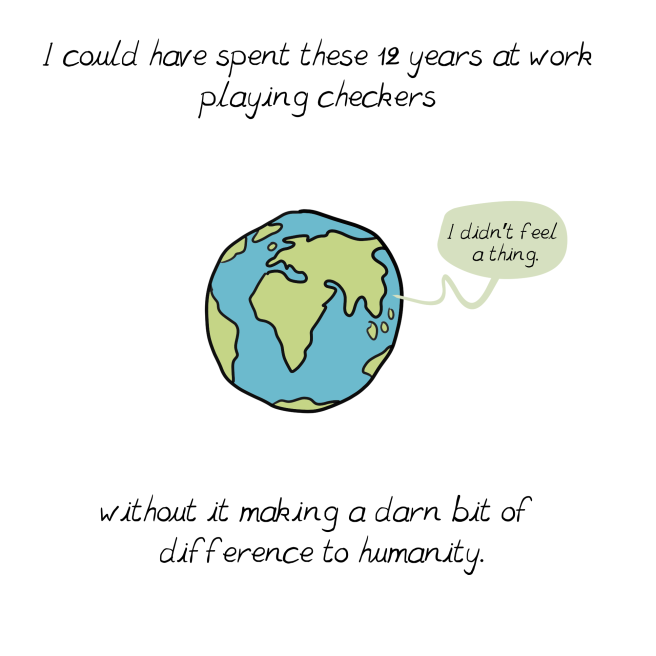
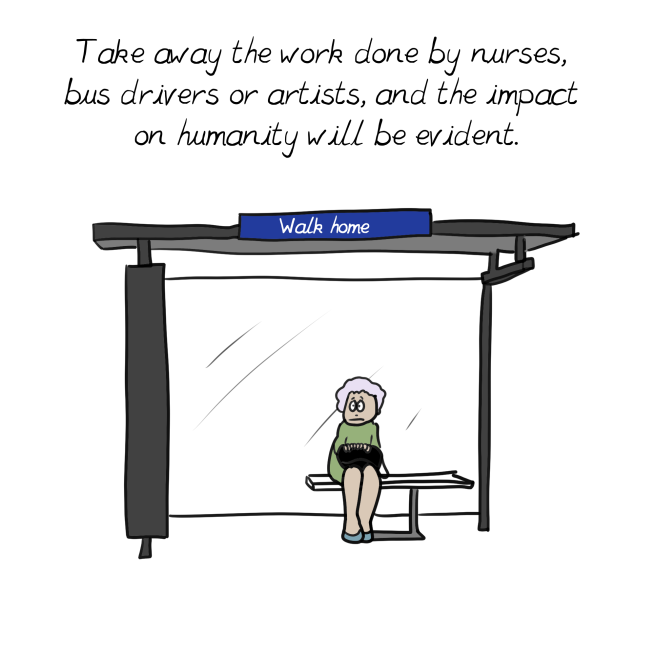
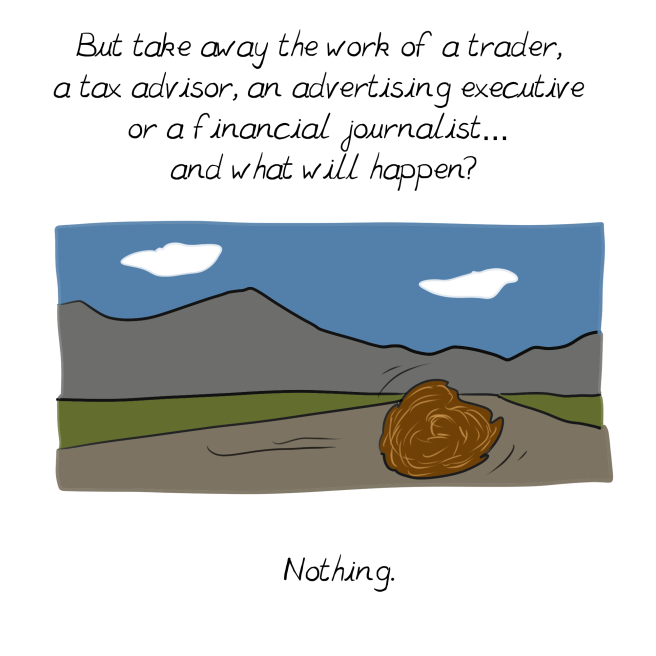




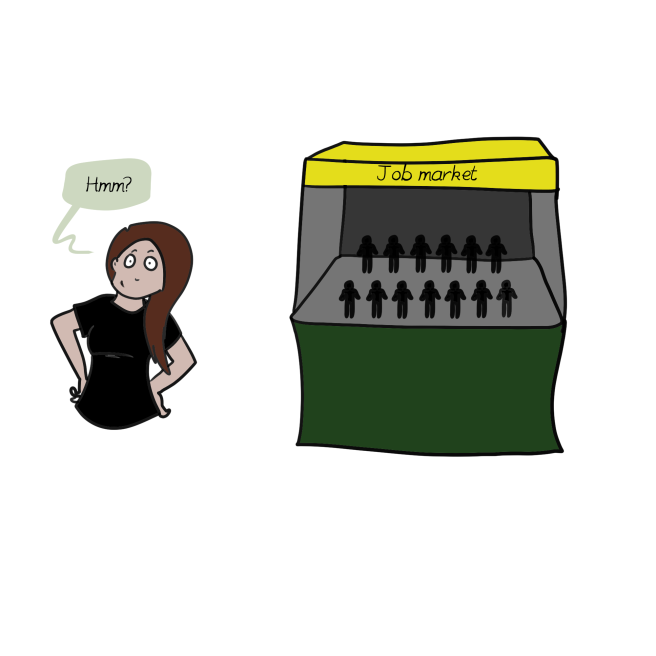
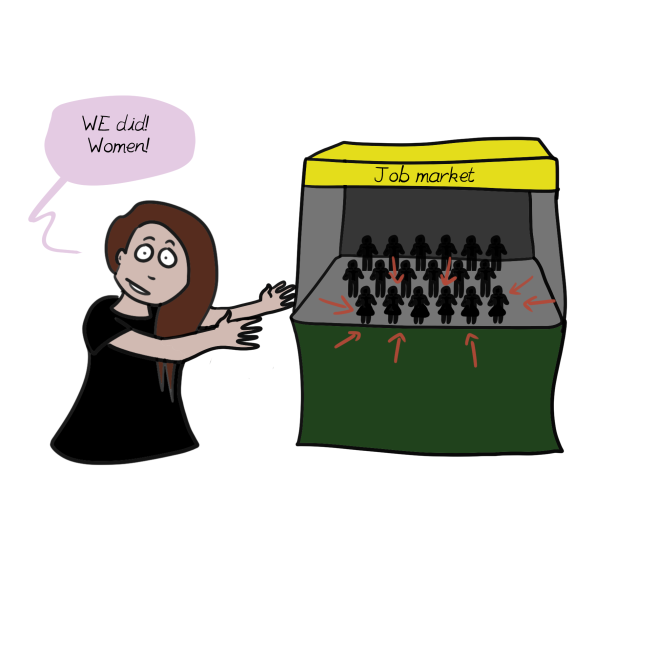
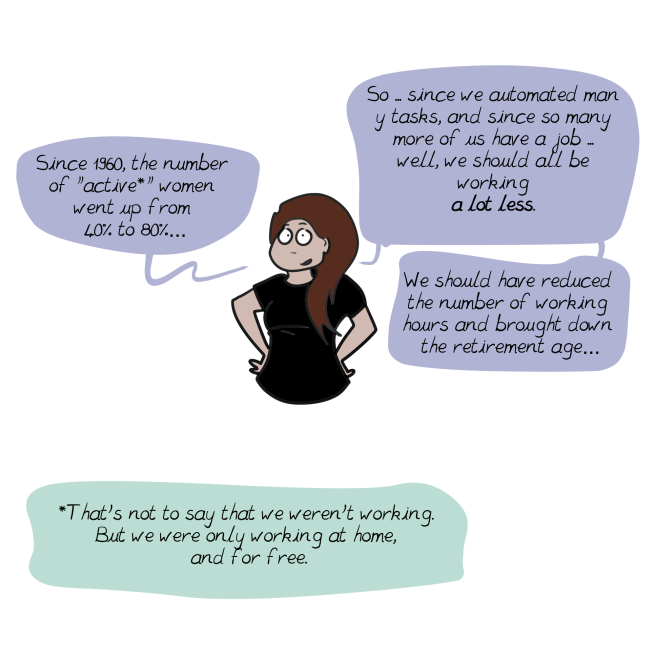
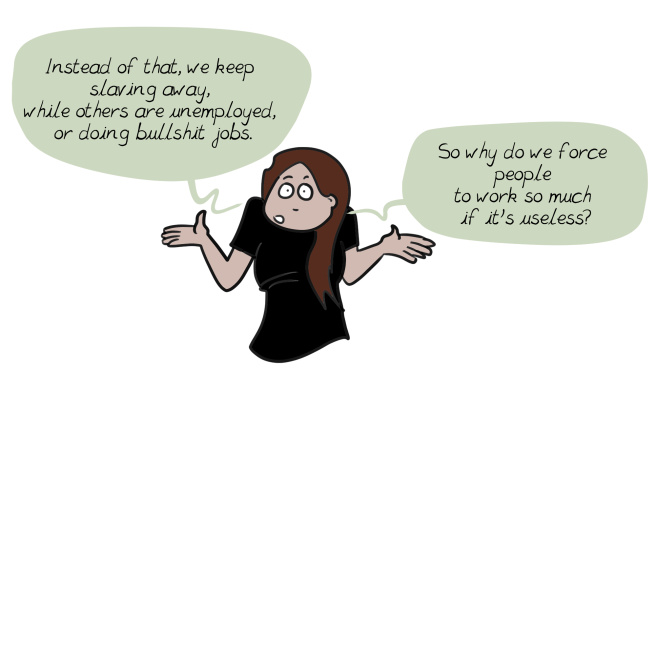
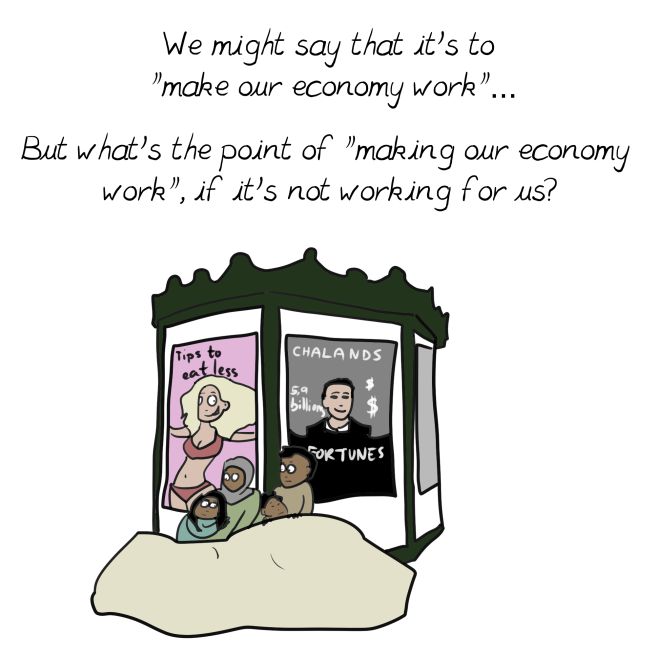
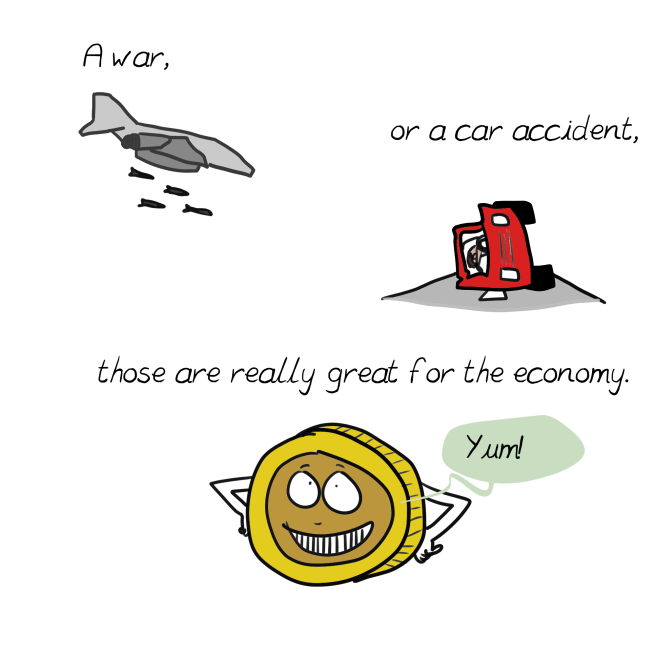

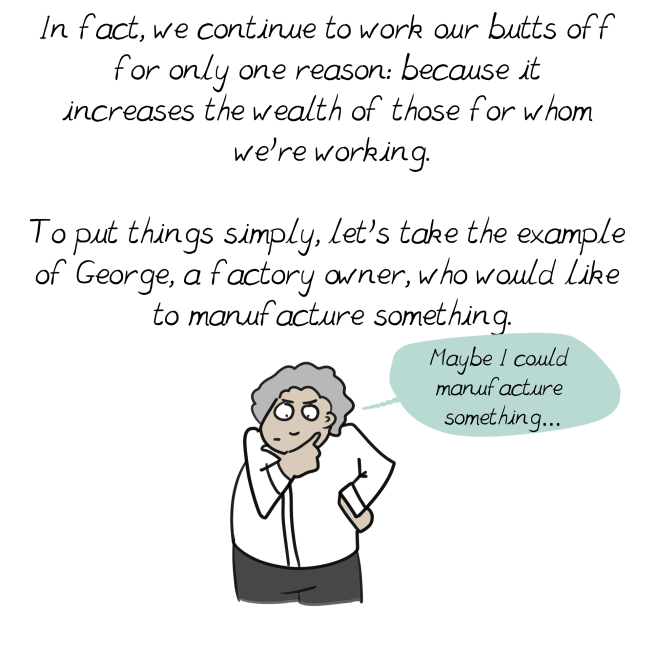
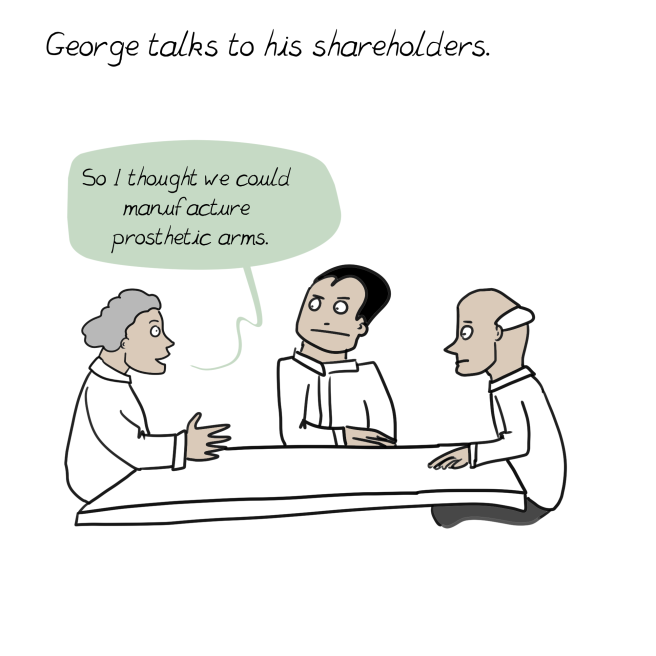

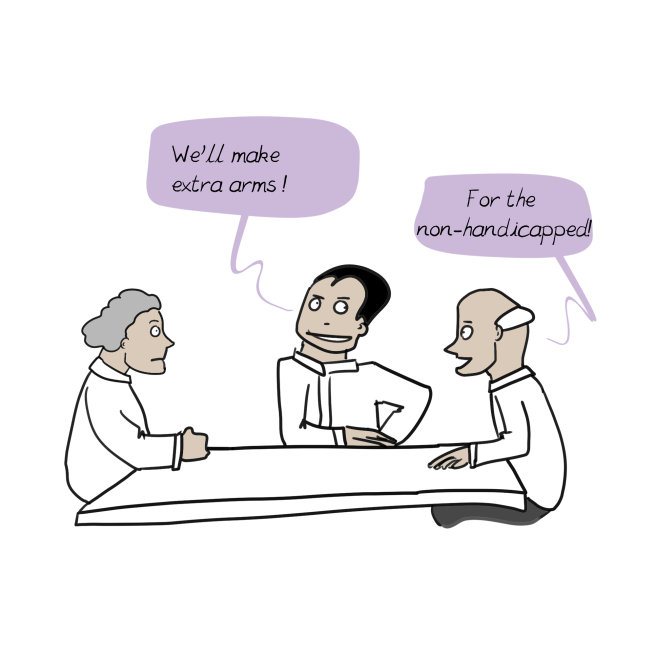

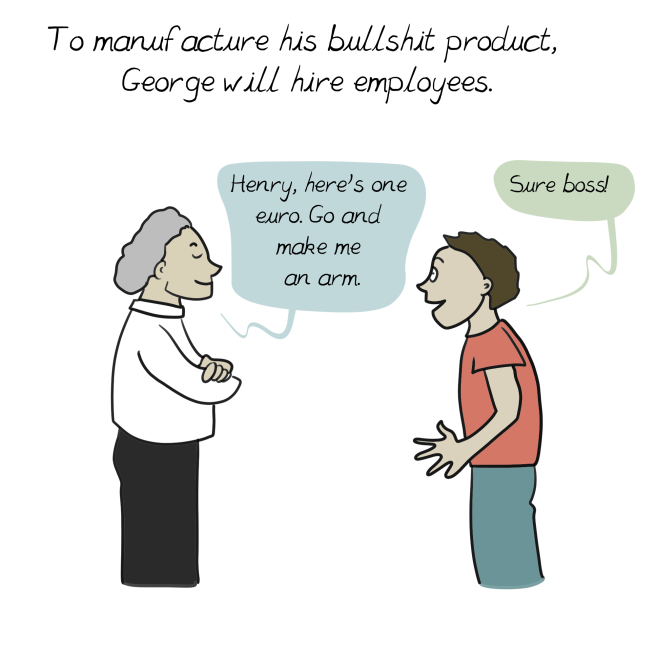
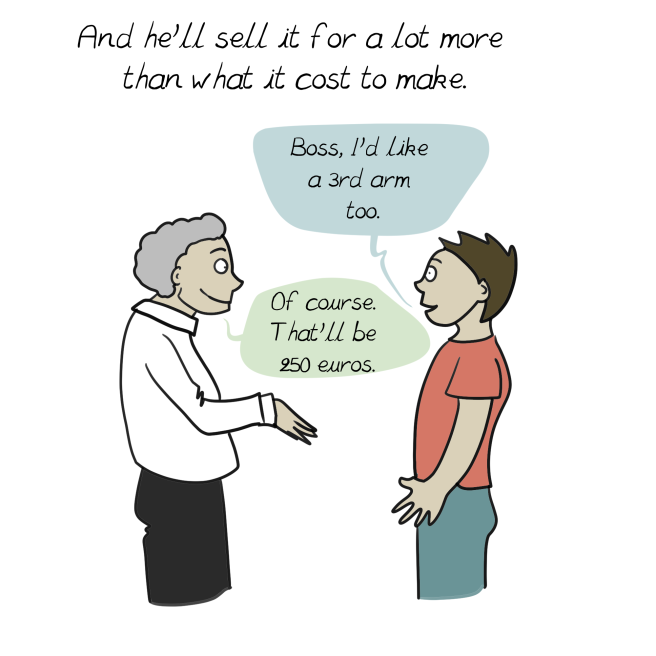
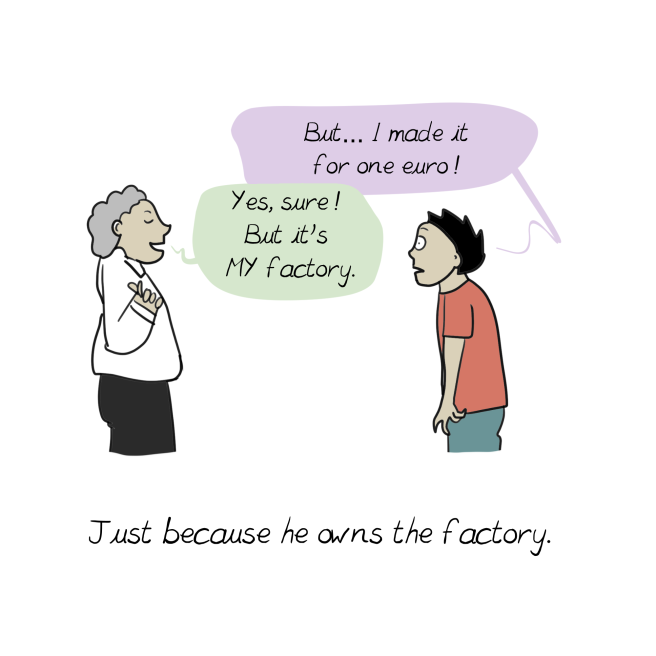
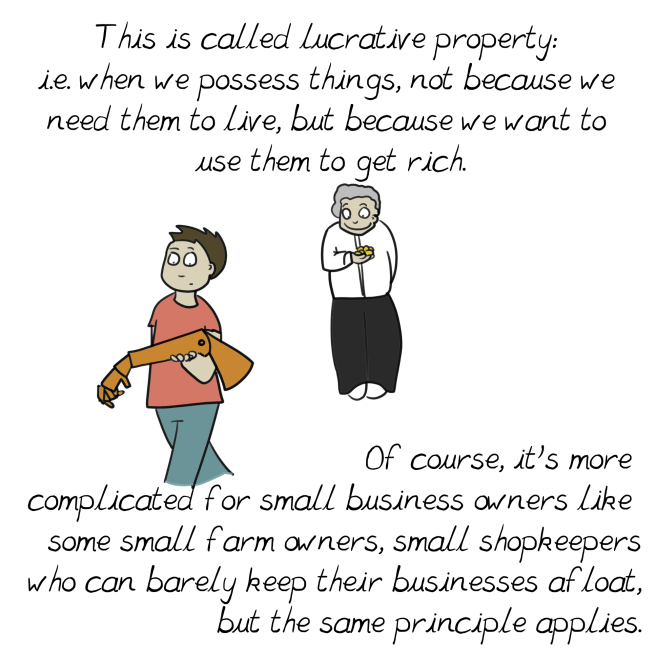
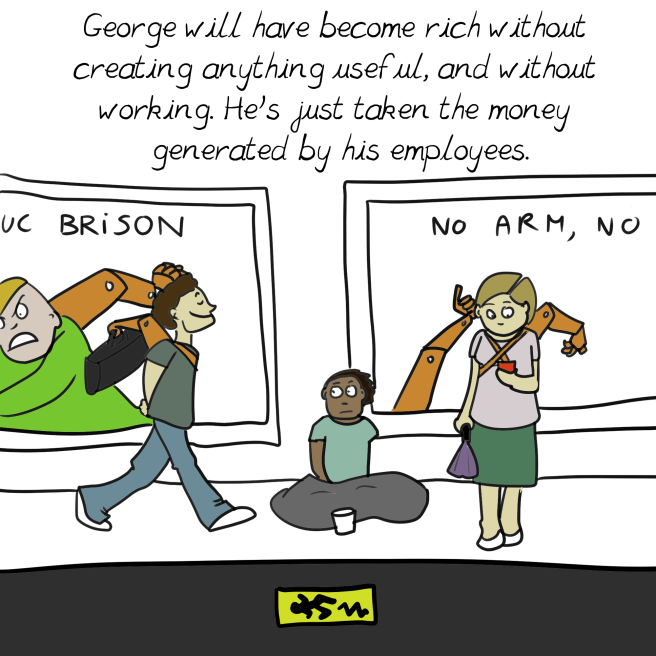
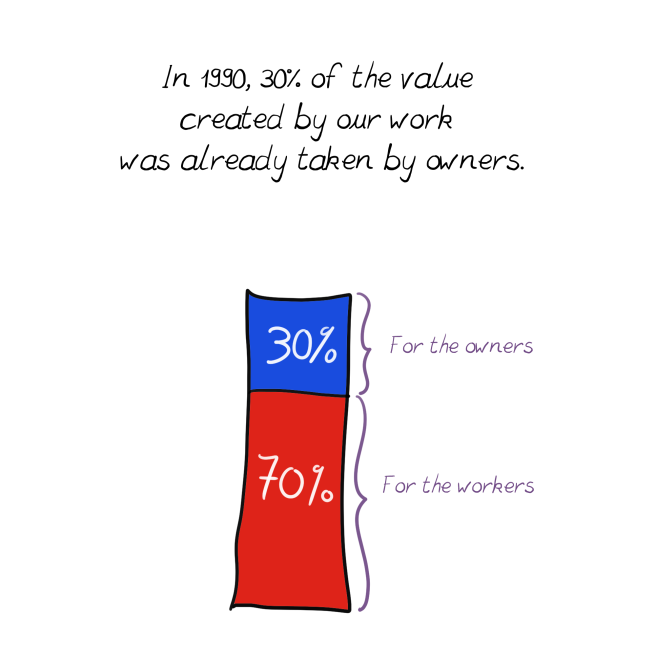

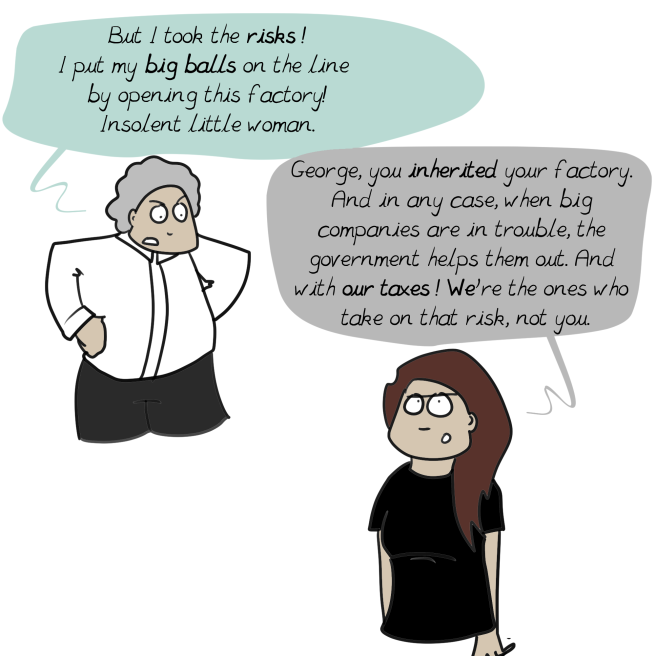

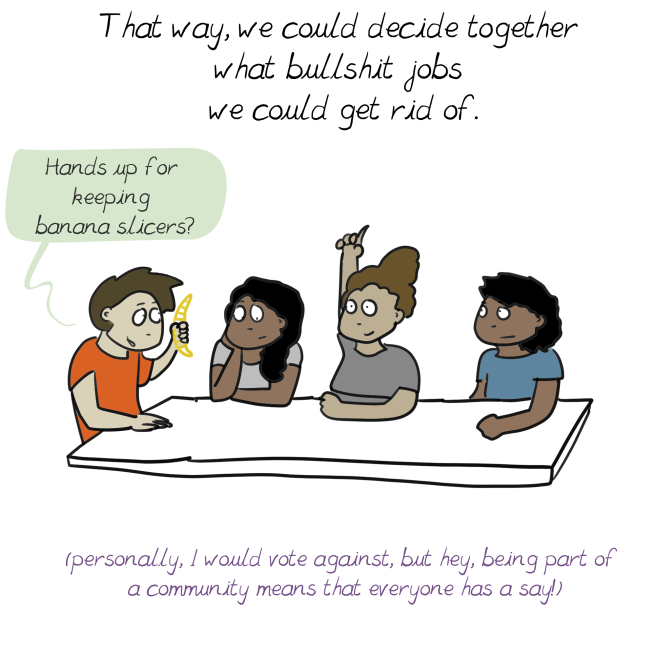
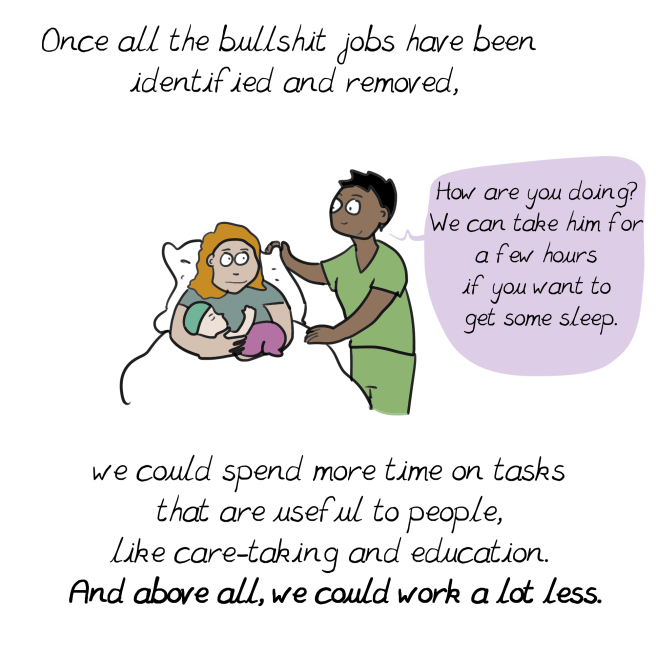
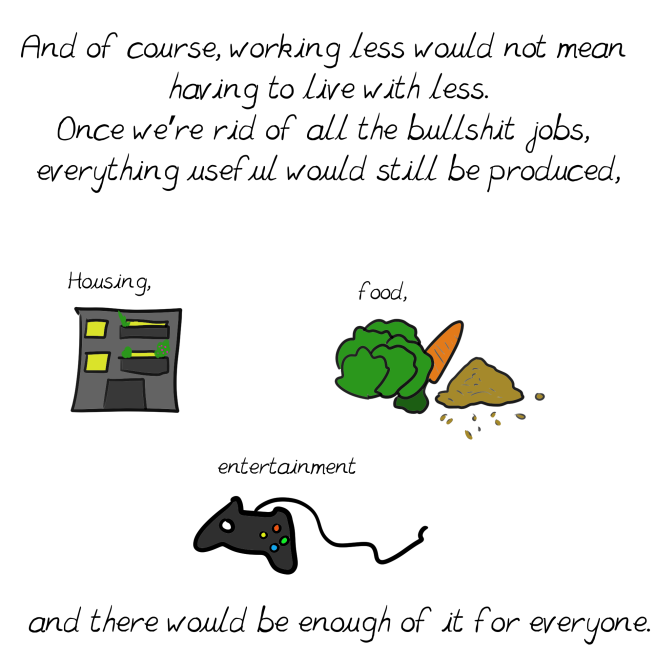


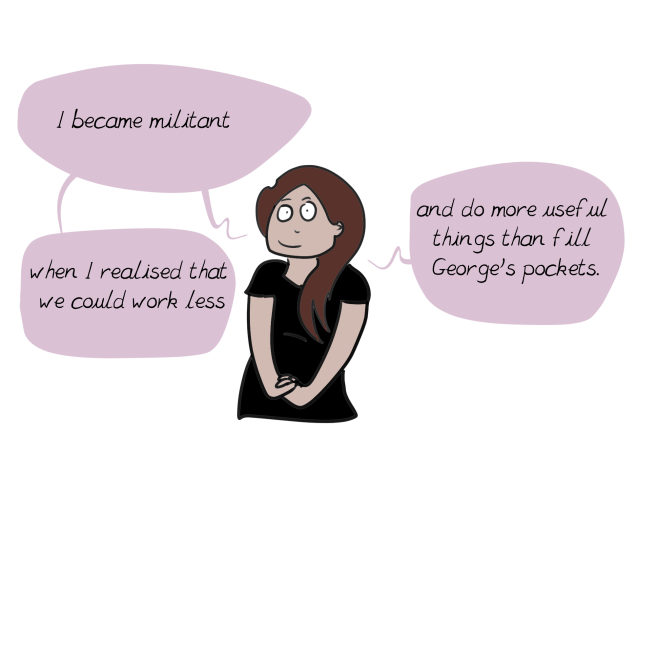
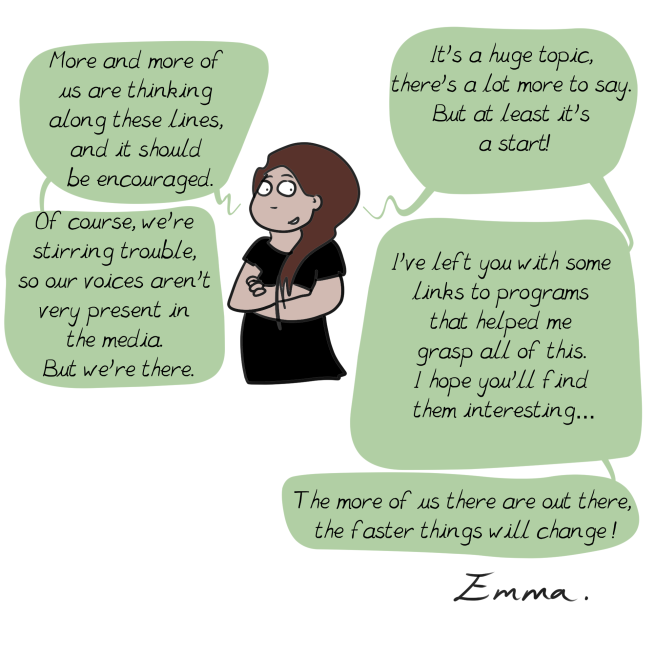

This is absolutely wonderful, Emma!
LikeLiked by 1 person
oh boy… this is so depressingly true…*facepalm* I love this so much..!
LikeLiked by 1 person
Excellent Emma, loving your work. Thank you.
LikeLike
An hour for lunch seems like an impossible dream. I consider my work to be useful (I’m a librarian), but boy what I wouldn’t give to have more than a half hour for lunch!
LikeLiked by 1 person
Amazing work, thank you! I’ll be assigning it for my Women’s Studies classes. I do a social re-imagining exercise at the end of the term. This video has a few of the central ideas: https://youtu.be/8_LPmR2ll9s (after minute 5).
these are the activities that students work through in small groups during class time: https://www.dropbox.com/s/em6zvsyxnngjxkm/Radical%20reimagining.pdf?dl=0
happy to nerd out anytime, thank you for your great work!
http://www.everydaysocialjustice.com
LikeLiked by 1 person
Dear Emma, your comic really struck me and made me rethink my whole career and my professional-being. Did you actually manage to get out of your bullshit job? I think the realization of being part of a shitty system is not as hard as getting out of it and manage to live a good life (where you’re not being exploited as I see it in our society: jobs that are contributing to humanity are the worst paid and make you feel really frustrated).
LikeLike
Thank you, Emma! This really makes you think. I am an American expat living in Italy and I remember thinking when I first moved here how much less money must be spent on things like advertising in Italy (if you look around, it’s fairly obvious to American eyes) and also how much better the quality of life is here in many ways regarding the necessities. This comic made me see how these two factors might be connected… I also wonder if less “bullshit jobs” in Italy also plays a role in it being ranked the healthiest country in the world despite its economic struggles…interesting to think about. thanks for your constant inspiration!
LikeLiked by 1 person
What is sad is I’ve tried my very best to have meaningful jobs e.g. in government, health, charity and social change. But I always end up loosing interest because in the end those jobs were bullshit too I don’t think they had the power to change anything. Everyone who works in those sectors knows it, which is why we all end up with the same outlook that you described. The truth is if wealth distribution was fairer our bullshit social change jobs wouldn’t be necessary.
LikeLike
Hi! I’m a guy and a programmer. While my jobs are at times BS, one thing I’ve done is be upfront when I interview — I come in around time x, and I leave at time y so I can do “family time” at night. I can work some after family time, but I will not stay at work or do work at home during those hours. If something really really needs to get done, then so be it and I’ll squeeze it in at the end of the day/early the next morning. I’ve also stopped taking jobs with start-ups, and my schedule is something that is non-negotiable. So far I’ve managed to stay employed doing things that I think are cool. I believe this is one way to “move the needle” a bit towards a.) less BS at work, and b.) more time with family to do important things that need to be done at home.
LikeLike
One hour for lunch so you “have to eat quickly”? I get half that. Be glad you get a while hour.
LikeLike
*whole
LikeLike
I am a nature protection student and a programmer. I have limited wish to keep on being the latter.
But I have three issues with this rail of thought here.
First and least, that automation in the food industry brings about an array of environmental damage.
This is so, because agriculture can only be efficiently automated in greenhouses or on tillage. And the ther point of automation is the production of processed foods.
Greenhouses need a bunch of fertilizers and insecticides, lacking healthy soil and associations. And tillage is even worse, for it actually erodes the soil. These do have technological solutions ‘though, but I still stand by producing most anything at home.
And processed foods go with a whole lot of waste: the wrapper, the transportation and the storage.
Second, that I don’t see it minding the reason and history of this system’s comeabouts. That is, in short, that people are greedy and aggressive. So the stronger guy kills the weaker one for the latter’s goods. And so the weaker guy seeks out an even stronger guy, and gives away some of his(/her) values in exchange for protection.
And then we have division of labor.
Mix the two add the knowledge of someone who actually understands this stuff (as opposed to me), and I bet the entire package will be completely reasonable.
Third, that I feel that even the most bullshit of jobs take part in such a complicated web, that one can’t just pick some off without impacting a number of actually needed ones.
And so for a change for the better the entire system needs to be reformed. And that is only possible via a dictatorship or gradual and widespread change.
Dictatorship brings about many dangers, which I don’t think I need to elaborate on.
And a gradual change is all but near impossible. Because have it started in politics and economy – and until not long after will it not fatefully empower EXACTLY the countries and owners who stand by the “old way”?
Or we would have dozens (or hunderds?) of millions of people carefully, thoughtfully and steadily heading for the same goal? Please.
So here we are, and I see no other way, than either a truly good dictatorship or a host of dedicated, careful and powerful decision makers, civil communities and yes, owners working together.
Footnote: the communists did try the dictatorial way in the 19s Eastern EEurope, if anyone would be interested in that or in the “power of the people”. It went about as good as anyone could expect.
Because indeed “narrow is tha gate and difficult is the way”.
LikeLiked by 1 person
Sorry for the spelling errors…
LikeLike
I would keep the banana slicer, for the ease of disabled people and convience
LikeLike
The system is currently set up for the manufacturer to be successful or fail. He can only make a profit if people buy his item. Don’t buy what you don’t need, spend your money on things that matter to you (time saving appliances, social support groups), save your money so you aren’t controlled by a job you don’t find fulfilling.
LikeLike
Omg.. Yes, yes and oui! Je suis complètement d’accord! Commence la révolution!
LikeLike
I can’t believe people complain for having an hour to eat. Out of an 8 hour workday you want 2 hours to be your lunch break? And you wonder why you’ve been doing the same thing for ten years…
LikeLike
Well I’ve read your comics and I totally agreed with you when it came to maternity and mental load etc. But I must say that your concept here abot solving the work issue scares me to death because it seems to be a communist revolution. You did not have it France but we went through communism in Poland and believe me (as much as I agree with you it’s slavery to work like we do today) the solution you proposed is so much worse! Communism is a beautiful utopian concept but the history showed us it doesn’t work, because some people are just smarter and more clever than others and will exploit those who are in more voulnerable position.
I understand that the current system isn’t perfect too, but at least if you don’t want to work for George, you can start something for your own and make profit of work of others who don’t have guts, ideas or most often the will to start their own businesses.
LikeLike
I don’t know if you’ll see this reply, but for what it’s worth I agree with you. I don’t know what the popular culture is like in France, but in the US there is a rapidly growing pro-communism sentiment, particularly among young feminists. And it scares me, too.
LikeLike
The problem is most of our bullshit jobs are government jobs, and those in charge won’t eliminate their own positions. They would have to be self-sacrificial and think of the greater society.
LikeLike
I can’t believe the number of comments here (from women no less!) who are only able to focus on the fact that the artist gets half an hour longer lunch break than them… That’s really sad. “Because I have it even worse than this person, they should not be allowed to complain about this systemic problem in our society”. Is that really all you were able to take away from this entry?
LikeLike
Has anyone read, ‘Why women have better sex under socialism’, K. Ghodsee.? Some great arguments for economic reform in an accessible, not overly academic, format.
LikeLike
I think that this post overlooks a lot of important points of views that are in favor of George. One thing that I’ve noticed myself is that the Georges of the world tend to be highly intelligent, highly motivated and highly capable. They’ve often worked really hard because they’re passionate about building something, and that’s what nets them the investment money to begin with.
On the flip-side, I’ve also worked in more co-op-oriented contexts, and they tend to be incredibly slow-moving. Either everyone’s lazy and puts in the minimum possible effort, or the unremarkable opinions of every single person needs to be heard, which turns every decision into a design-by-committee-type situation where it’s the quality of the weakest link that counts.
I’m not even saying that what you’re proposing is wrong, but it’s such a one-sided image that doesn’t recognize its own significant downside or the complexities and dynamics of the economy. It actually is utopian in that sense.
My personal hypothesis is that a mix of both sides might be the best way forward – like maybe having UBI or something like that. That way innovators could innovate, and those who don’t want to participate don’t have to participate.
LikeLike
This explains a lot. My current job is the first one I like, but I don’t understand why, since it’s a job most people look down on. Makes sense now: because it’s not a bullshit job. In the past, I’ve mostly worked for advertising agencies and multinational companies that are already extremely rich. Now I work at a family-owned restaurant that has kept most of the same customers for 20+ years. Thank you for enlightening me! I don’t intend to work at a restaurant forever, because the money isn’t enough and it’s hard work, but recently I’ve been thinking about not going back to what I did in the past and to try something else instead – this settles it.
LikeLike
Heyyyyyyyyy Emma you can’t talk about bullshit jobs without referencing David Graeber…
That’s a theory he developed and a concept he came up with. Credit where credit’s due eh?
Really appreciate your work in general!
LikeLike
Heyyyyyyyy, actually I didn’t know about his work when I worked on this comic. I based my research on a sociologist named Bernard Friot’s work.
As you can see in the introduction I am very careful about sourcing my work and crediting people, all the more than mine is used everywhere without asking and paying. Because you know drawing is not really work.
Anyway, thanks for kindly reminding me about Graeber, if you have an article I can add I will be happy to.
LikeLike
Outstanding post, very well put, thank you 😊
LikeLike
I dont believe I understood what´s supposed to be the solution. Can you give me a concrete example and what would happen with it?
For example, say we have geore, the example you were puting in, what you propose happen with his factory? must the government take it and give it to someone else? how does the government decide which factories it takes?
How does the government decides which jobs are “bullshit” ? and once it has decided that they are bullshit how does it prevent people from working on those things?
What happens if we have Sally, a small business owner like there are many (yes, I do see you made a passing comment on them) trying to get her business ahead, should she be able to hire the people that she sees fit? and if she does and the one that is more efficient ALSO spends more hours there, she can promote this person instead of the other one that went to his/her family, or should something prevent her from doing this?
LikeLike
Hi.
The solution doesn’t imply government action but collective action.
It means that every factory is managed by its workers in the interest of community, instead of being managed by a few shareholders in the interest of themselves. So many disasters would have been avoided if we had done this already … like in France some toxic drug called Mediator which has been kept on the market just because it was profitable … many persons died. Or further away, during WWII, a lot of french industries (like automobile factories) collaborated with the Nazis, building what was needed to make concentration camps because hey, business is business. Capitalism is not evil, it is just irrational and irresponsible. Its only frame is profit, all the decisions are made inside this frame. If a decision is humanly and socially logical but out of this frame – like let’s say, stop using fossil fuel to save the climate – it won’t be taken because it’s not profitable. That’s the only reason why we are all likely to die in a few decades. It’s not bad luck, it’s not “humanity”, it’s profit and capitalism.
So how do we make that happen well we have to use constraint because capitalists won’t allow their factories to be collectivized. But the factories only work because of workers, not because of owners. If workers don’t work, owners don’t own anything valuable. So I would say that massively going on strike is a very efficient way to block capitalism and change everything.
And for Sally who is a small business owner, she is probably working 20 hours a day to make her business work. She probably doesn’t have so much money. So I think Sally will be very happy to share her business with people willing to help. She would have a far better life. And if she doesn’t want to well nobody will prevent her to keep her business but my guess is that nobody will want to be her employee as we will have some far better and collective opportunities elsewhere. So I guess Sally will join the community. Her choice, though.
LikeLiked by 1 person
Well, first of all thanks for the reply!
Here are some of my thoughts regarding what you said:
-The circumstance you tell me about sounds horrible, but for me to think it´s a problem with capitalism I would need to think it wouldnt have happened on, say, feudalism. Greed is a human quality, capitalism didn´t invent it. A king or feudal lord would as happily let “his” people under any conditions if it brings him wealth. One is at the mercy of whatever morality they may have. I do definetely agree there is a position for the government to intervene on several areas to avoid companies getting too destructive, just like it regulates people.
-If I understood you (and I welcome corrections if I dont) you say that the solution you would propose would be for people to make a massive strike so huge that companies inside of a country wouldnt find people willing to work for the regular deal, but only on a company owned by everyone. I must say without laws forcing people to make such a thing (which of course would mean the government) I find it very difficult to imagine. A company that has less people making the managing, people who are better specifically for that job would be more succesful than a company that doesnt more often than not, which would end up meaning it would outcompete the companies that are owned by collectives.
-As you were well said, Sally would almost surely be overworking herself, but how would she make sure she is getting the proper people taking the mental job off her head? she wouldnt just want to work less hours, she would want to know that she is delegating to people that will make things as well or better than her. These people would have a very different set of skills than the people that manufacture the products and depending on supply and demand it will be more efficient for her to work the old fashioned way.
Did I get any of that wrong in your opinion?
LikeLike
It’s a problem with class society. Feodalism was one (although farmers were not as alienated as we tend to think on feodalism. It doesn’t mean they had a great life but at least every of their moves was not timed by a software and judged by a manager)
Human nature does not exist. It has been largely proved by anthropologists. Humans are a mirror of the society they live in.
I’m sorry I don’t have time for long one to one debates with every person but let’s say this comic is kind of an introduction to communism, if you’re interested in this you can maybe read Marx (Karl and Jenny) and Engel’s manifest
I think this is important to think about a new society as we have not much time left with climate change.
LikeLiked by 1 person
Karl Marx talked about violently ceasing the means of production… If you direct me to Marx as per how do things change for George, I would have to believe George´s factory would be ceased by means of violence perpetrated by the common people.
and I dont see why Sally wouldnt find herself in the same problem.
LikeLike
I appreciate the time you have given me, I do appreciate you got quite a following. Yeah we would disagree on some important prime assumptions.
Agreed on climate change, though government stopping the subsidies to the meat Industry would be a bigger help against it than most people would imagine.
LikeLike
I love your work (found your site via a link from a different one of your comics). The art and language is just great.
For this particular comic’s point, it’s possible that the bus driver and nurse wouldn’t stay afloat without the income generated and passed forward from the advertising executive and financial journalist. Maybe not your eyes, but they are providing value in someone’s eyes.
LikeLike
As a Pole… We had that. It ended badly. Everything was bland, resources were limited and you had no choice in anything. One type of toilet paper, one type of (uneatable) sosage, one type of boots, one type of furniture because there was no reason to “invent” better choice – you know – no market, no advertising, no competitive advantage. People didnt even try…
Tere is a saying: jak coś jest wspólne, to jest niczyje (when sth is everyones, its noones)
LikeLike
The premise of this essentially boils down in part to the idea that people’s personal buying/spending choices aren’t what’s best for most people or the planet. Because if they were then the market would sort itself out.
That said, there is also the fact that the current system (market) can be manipulated in disengenous ways that usurp the intended process and outcome, and sidestep the intended method (letting people’s choices decide the success of ventures/businesses)
LikeLike
Sosososo true!!! And so good!! Thank you for writing this!!!
I‘ve been thinking a lot about this as well and i utterly agree with you and im glad to know more people think along these lines.
LikeLike
I realise that this post is quite a few years old, but for anyone interested, Paul Lafargue’s book, ‘The Right to be Lazy’, introduces the same concept (and was written in 1883!). I only hope that we might one day be able to enjoy our lives more instead of making others rich with our time and labour.
LikeLike
so….what mental load exactly do you want to deal with? you just want to live in a utopia?
LikeLike